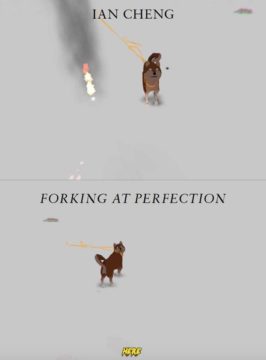The work of the American artist Ian Cheng (b. 1984, Los Angeles, lives in New York) explores the nature of mutation and people’s capacity to relate to change. Drawing on principles of video game design, improvisation, and Darwinian brutality, Cheng has developed so-called „live simulations,“ virtual living ecosystems that begin with basic programmed properties, but that are left to evolve without authorial control or aim. His simulations model the dynamics of often-imaginary organisms and ecologies, but do so with the unforgiving causality found in nature itself. Cheng, who studied cognitive science at the University of California, Berkeley, describes his simulations as akin to a „neurological gym“: a format for viewers to deliberately exercise the feelings of confusion, anxiety, and cognitive dissonance that accompany the experience of unrelenting change.
This monographic publication delivers an exploration of Ian Cheng’s most recent „live simulations,“ and the state of human consciousness in the digital era. In addition the book highlights the artist’s crucial point of reference—the controversial evolutionary history of human self-awareness by American psychologist Julian Jaynes, „The Origin of Consciousness in the Breakdown of the Bicameral Mind“ (1976).
The publication includes contributions by Ian Cheng, Raphael Gygax, and Franziska Bigger, and a selection of texts by the artist.
Published with the Migros Museum für Gegenwartskunst, Zurich.
- Veröffentlicht am Montag 31. März 2025 von JRP Ringier Kunstverlag
- ISBN: 9783037644713
- 140 Seiten
- Genre: Bildende Kunst, Kunst, Literatur, Sachbücher
